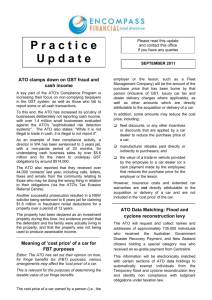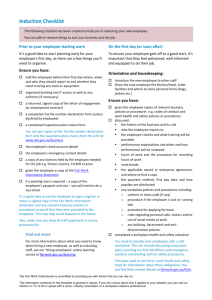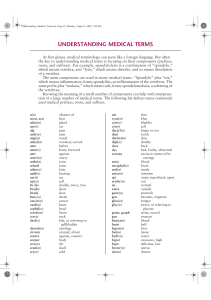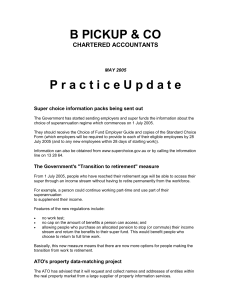Business News - March 2014
advertisement
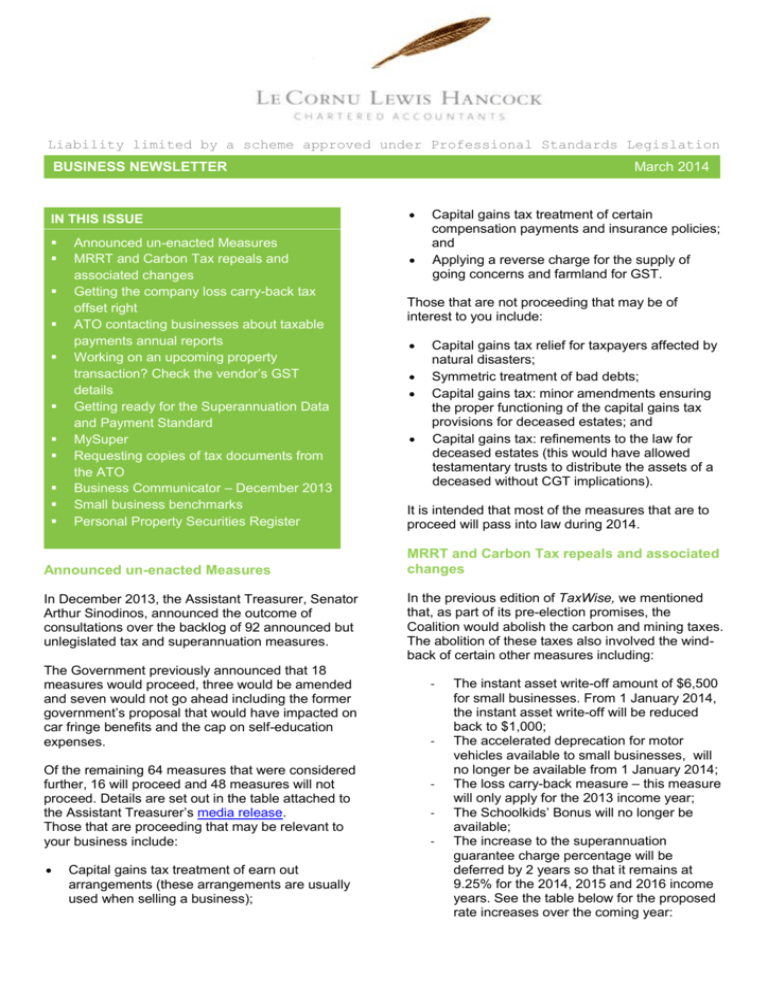
Liability limited by a scheme approved under Professional Standards Legislation BUSINESS NEWSLETTER March 2014 IN THIS ISSUE Announced un-enacted Measures MRRT and Carbon Tax repeals and associated changes Getting the company loss carry-back tax offset right ATO contacting businesses about taxable payments annual reports Working on an upcoming property transaction? Check the vendor’s GST details Getting ready for the Superannuation Data and Payment Standard MySuper Requesting copies of tax documents from the ATO Business Communicator – December 2013 Small business benchmarks Personal Property Securities Register Announced un-enacted Measures In December 2013, the Assistant Treasurer, Senator Arthur Sinodinos, announced the outcome of consultations over the backlog of 92 announced but unlegislated tax and superannuation measures. The Government previously announced that 18 measures would proceed, three would be amended and seven would not go ahead including the former government’s proposal that would have impacted on car fringe benefits and the cap on self-education expenses. Of the remaining 64 measures that were considered further, 16 will proceed and 48 measures will not proceed. Details are set out in the table attached to the Assistant Treasurer’s media release. Those that are proceeding that may be relevant to your business include: Capital gains tax treatment of earn out arrangements (these arrangements are usually used when selling a business); Capital gains tax treatment of certain compensation payments and insurance policies; and Applying a reverse charge for the supply of going concerns and farmland for GST. Those that are not proceeding that may be of interest to you include: Capital gains tax relief for taxpayers affected by natural disasters; Symmetric treatment of bad debts; Capital gains tax: minor amendments ensuring the proper functioning of the capital gains tax provisions for deceased estates; and Capital gains tax: refinements to the law for deceased estates (this would have allowed testamentary trusts to distribute the assets of a deceased without CGT implications). It is intended that most of the measures that are to proceed will pass into law during 2014. MRRT and Carbon Tax repeals and associated changes In the previous edition of TaxWise, we mentioned that, as part of its pre-election promises, the Coalition would abolish the carbon and mining taxes. The abolition of these taxes also involved the windback of certain other measures including: - - The instant asset write-off amount of $6,500 for small businesses. From 1 January 2014, the instant asset write-off will be reduced back to $1,000; The accelerated deprecation for motor vehicles available to small businesses, will no longer be available from 1 January 2014; The loss carry-back measure – this measure will only apply for the 2013 income year; The Schoolkids’ Bonus will no longer be available; The increase to the superannuation guarantee charge percentage will be deferred by 2 years so that it remains at 9.25% for the 2014, 2015 and 2016 income years. See the table below for the proposed rate increases over the coming year: Year From 1 July 2013 From 1 July 2014 From 1 July 2015 From 1 July 2016 From 1 July 2017 From 1 July 2018 From 1 July 2019 From 1 July 2020 From 1 July 2021 Superannuation guarantee charge rate 9.25% 9.25% 9.25% 9.5% 10% 10.5% 11% 11.5% 12% The Government will also not proceed with the following personal income tax changes which were to commence on 1 July 2015: - Increase in the tax-free threshold from $18,200 to $19,400; Increase the income tax rate to 33% (from 32.5%) for the income bracket $37,001 - $80,000; The Bills containing the repeal of the carbon and minerals rent resource tax and the measures listed above were sitting before the Senate at the time of writing. It is anticipated that these changes will pass through Parliament shortly. Getting the company loss carry-back tax offset right As the company loss carry-back tax offset does apply in the 2013 income year, it is important for taxpayers who are able to carry back losses that they get their claims right. The ATO has advised that it has received a number of 2013 Company tax returns where the loss carry-back tax offset has been claimed incorrectly. This has caused delays in processing of these returns. ATO contacting businesses about taxable payments annual reports Recently, the ATO has been telephoning some businesses in the building and construction industry directly to: test the levels of understanding of the requirements of the new system; and help businesses to comply with their taxable payments annual reporting obligations. It has also been contacting them to: ensure lodged reports are correct and complete; follow up with businesses that have not yet lodged a report (where ATO records indicate they should have); and follow up with businesses who have advised the ATO that they are not required to report (where ATO records indicate they have a reporting requirement). The businesses are being contacted directly even if they are clients of tax agents. Note! If you have received one of these calls from the ATO and are not sure whether you have an obligation to lodge a “Taxable Payment Annual Report”, you should speak to LeCornu Lewis Hancock. If you have not received one of these calls but are concerned whether you have an obligation to lodge one of these reports, you should also speak with LeCornu Lewis Hancock. Working on an upcoming property transaction? Check the vendor's GST details The loss carry-back tax offset, for the financial year in which carry-back tax losses are claimed, must be the lowest of: the loss carry-back tax offset component for the 2011-12 financial year the maximum $1,000,000 of losses multiplied by the corporate tax rate ie $300,000, or the franking account balance at the end of the financial year in which the claim is made. To do! If you think you are able to claim this offset, LeCornu Lewis Hancock will be able to assist you and help you get your claim right. Are you about to purchase some property? If so, you should know whether the vendor is registered for GST as this may affect your transaction. The ATO has advised that it has recently disallowed claims for input tax credits related to the purchase of commercial real property. In these cases, the ATO has noticed that the taxpayers and their agents failed to check that the vendor was registered for GST at the time of settlement. The ATO’s advice and information about what to check for, is listed on their website. However, the best source of advice will be from LeCornu Lewis Hancock who can help ensure you obtain necessary information about the vendor’s GST status prior to your property transaction. Getting ready for the Superannuation Data and Payment Standard The ATO has published a document entitled "Employer FAQs - Getting ready for the standard". The standard is a part of SuperStream, a package of measures designed to enhance the superannuation system. Under the standard, employers will make superannuation contributions on behalf of their employees by submitting data and payments electronically in a consistent and simplified process. Starting dates are as follows: If an employer has 20 or more employees (large or medium employer) – they must start using the standard from 1 July 2014. If an employer has 19 or fewer employees (small employer) – they must start using the standard from 1 July 2015. For a new employer (starting their business after 1 July 2014) or for an employer that grows to have 20 or more employees after 1 July 2014 – they must start using the standard from the first contribution date where they exceed the threshold of 19 employees. In November 2013, the ATO sent information directly to medium and large employers to encourage them to investigate their options and start preparing for the data and payment standard. All employers affected by this change should start preparing for the changes. Note! It is important that employers affected by these changes understand their obligations and are able to meet the requirements. LeCornu Lewis Hancock will be able to assist you to understand and meet your obligations. Requesting copies of tax documents from the ATO The ATO advises that a taxpayer or their authorised representative can use "Copies of tax documents request – individuals and authorised representatives" form to request copies of tax returns, payment summaries and notices of assessment. There is a separate form for businesses. Business Communicator - December 2013 The ATO has published its Business Communicator for December 2013. Business Communicator contains news and updates for businesses with an annual turnover between $2 million and $250 million. It deals with the following topics: Getting ahead with good records; MySuper changes – what employers need to know; Helping high-risk industries with super obligations; New data and payment standard for employers; Increase to excise and customs duty on tobacco; AUSkey improvements; Check vendors details for upcoming property transactions; Interim Decision Impact Statement – MBI Properties Pty Ltd v. FCT. For a copy of this publication, visit the ATO website Business Communicator. Tip! This document has useful general information for businesses. However, for specific information about issues that may be referred to in the document, you should speak to LeCornu Lewis Hancock. Small business benchmarks MySuper From 1 January 2014, employers need to make superannuation contributions to a fund that offers a MySuper product for any employee who does not select a preferred fund. If an employer has not heard from their super fund about their MySuper arrangements, they should contact the fund now. The ATO has posted a short video presentation containing more information about this change. The ATO advises that the small business benchmarks have been updated with data from the 2010–11 financial year. Note! If you are unsure how the small business benchmarks apply to your business, speak to LeCornu Lewis Hancock. Personal Property Securities Register The Personal Property Securities Register (PPSR) is a single, national register of security interests in goods and other personal property in Australia. The register is regularly used by buyers, sellers and financiers. Personal property generally includes all forms of property other than land, buildings and fixtures. If you carry on a business of leasing out valuable goods or selling goods on terms, such as retention of title, you should consider registering your property interest on the PPSR. Registering an interest in goods for which you have not yet received full payment can help recover the debt should your customer not pay or become insolvent. Failing to register your interest may lead to the property being available to pay off your customers other creditors. If you intend to purchase a valuable second-hand item you are able to check the PPSR to ensure the item is debt free and safe from repossession. The PPSR is accessible online at PPSR. There are fees for either conducting a search or registering a security interest. Search results are immediate. Note! If you believe the PPSR has implications for your business and would like to know more about it, please contact LeCornu Lewis Hancock. DISCLAIMER Taxwise® News is distributed by professional tax practitioners to provide information of general interest to their clients. The content of this newsletter does not constitute specific advice. Readers are encouraged to consult their tax adviser for advice on specific matters. ………………………………………………………………. Should you wish to receive future newsletter correspondence via email, please email us at contact@llh.com.au or alternatively complete and return the attached slip to our office. Name:…………………………………………. Email:…………………………………………..
